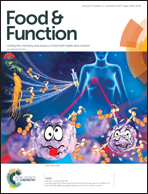Ubiquinol is superior to ubiquinone to enhance Coenzyme Q10 status in older men†
Abstract
Coenzyme Q10 (CoQ10) exerts its functions in the body through the ability of its benzoquinone head group to accept and donate electrons. The primary functions are to relay electrons for ATP production in the electron transport chain and to act as an important lipophilic antioxidant. Ubiquinone, the oxidized form of CoQ10, is commonly formulated in commercial supplements, and it must be reduced to ubiquinol to exert CoQ10's functions after consumption. Thus, we aimed to examine whether as compared to ubiquinone, ubiquinol would be more effective to enhance the CoQ10 status in older men. We conducted a double-blind, randomized, crossover trial with two 2-week intervention phases and a 2-week washout between crossovers. Ten eligible older men were randomized to consume either the ubiquinol or ubiquinone supplement at a dose of 200 mg d−1 with one of the main meals. A total of 4 blood samples were collected after an overnight fast for the determination of ubiquinone and ubiquinol in plasma and PBMC and the assessment of FRAP, total thiol, and malondialdehyde (MDA) in plasma and ATP in PBMC. After 2 weeks of the supplementation, the ubiquinol supplement significantly increased plasma ubiquinone 1.7 fold from 0.2 to 0.6 μmol L−1 and total CoQ10 (the sum of 2 forms) 1.5 fold from 1.3 to 3.4 μmol L−1 (p < 0.05) and tended to increase the plasma ubiquinol status 1.5 fold from 1.1 to 2.8 μmol L−1, but did not alter the ratio of ubiquinol to total CoQ10. The ubiquinone supplement insignificantly increases plasma ubiquinol, ubiquinone, and total CoQ10 and did not affect the ratio. Of 10 subjects, six were more responsive to the ubiquinol supplement and 2 were more so to the ubiquinone. The supplementation of both CoQ10 forms did not alter the CoQ10 status in PBMC. FRAP, total thiol, and MDA in plasma and ATP in PBMC were not changed during the intervention. The significant increase in plasma CoQ10 status observed after the 2-week supplementation suggested that ubiquinol appeared to be a better supplemental form to enhance the CoQ10 status than ubiquinone in older men. Neither ubiquinol nor ubiquinone supplement affected the measured biomarkers of oxidative stress.



 Please wait while we load your content...
Please wait while we load your content...
